 |


 The CIW is a community-based worker organization.
Our members are largely Latino, Haitian, and
Mayan Indian immigrants working in low-wage
jobs throughout the state of Florida.
The CIW is a community-based worker organization.
Our members are largely Latino, Haitian, and
Mayan Indian immigrants working in low-wage
jobs throughout the state of Florida.
We strive to build our strength as a community
on a basis of reflection and analysis, constant
attention to coalition building across ethnic
divisions, and an ongoing investment in leadership
development to help our members continually
develop their skills in community education
and organization.
From this basis we fight for, among other things:
a fair wage for the work we do, more respect
on the part of our bosses and the industries
where we work, better and cheaper housing, stronger
laws and stronger enforcement against those
who would violate workers' rights, the right
to organize on our jobs without fear of retaliation,
and an end to indentured servitude in the fields.
From the people, for the people:
Who we are...
 Southwest Florida is the state's most important
center for agricultural production, and Immokalee
is the state's largest farmworker community.
As such, the majority of our more than 2,500
members work for large agricultural corporations
in the tomato and citrus harvests, traveling
along the entire East Coast following the harvest
in season. Many local residents, and thus many
of our members, move out of agriculture and
into other low wage industries that are important
in our area, including the construction, nursery,
and tourist industries. The community is split,
roughly, along the following ethnic/national
origin lines: Mexican 50%, Guatemalan 30%, Haitian
10% and other nationalities (mostly African-American)
10%.
Southwest Florida is the state's most important
center for agricultural production, and Immokalee
is the state's largest farmworker community.
As such, the majority of our more than 2,500
members work for large agricultural corporations
in the tomato and citrus harvests, traveling
along the entire East Coast following the harvest
in season. Many local residents, and thus many
of our members, move out of agriculture and
into other low wage industries that are important
in our area, including the construction, nursery,
and tourist industries. The community is split,
roughly, along the following ethnic/national
origin lines: Mexican 50%, Guatemalan 30%, Haitian
10% and other nationalities (mostly African-American)
10%.
We are all leaders: Our history...
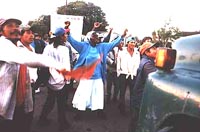
We began organizing in 1993 as a small group
of workers who met weekly in a room borrowed from
a local church to discuss how to better our community
and our lives. In a relatively short time we have
managed to bring about significant, concrete change.
Combining community-wide work stoppages with intense
public pressure -- including three general strikes,
an unprecedented month-long hunger strike by six
of our members in 1998, and an historic 230-mile
march from Ft. Myers to Orlando in 2000 -- our
early organizing ended over twenty years of declining
wages in the tomato industry.
By 1998, we had won industry-wide raises of 13-25%
(translating into several million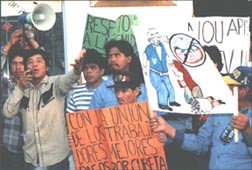 dollars annually for the community in increased
wages) and a new-found political and social respect
from the outside world.
dollars annually for the community in increased
wages) and a new-found political and social respect
from the outside world.
Those raises brought the tomato picking piece-rate
back to pre-1980 levels (the piece-rate had fallen
below those levels over the course of
the intervening two decades), but wages remained
below poverty level and continuing improvement
was slow in coming. At the same time, the phenomenon
of modern-day slavery was establishing a foothold
in Florida's fields. While continuing to organize
for fairer wages, we also turned our attention
to attacking involuntary servitude in our state.
From 1997-2000, we helped bring three modern-day
slavery operations to justice, resulting in freedom
for over 500 workers from debt bondage.
Since then, our Anti-Slavery Campaign has earned
national and international recognition, based
on its innovative program of worker-led investigation
and human rights education, and a track record
of real success. Our latest victory 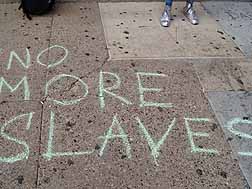 against
indentured servitude came in November of 2002,
when three crewleaders from Lake Placid, FL, were
convicted of forcing 700 workers into slave labor
in Florida's citrus groves. They were sentenced
in May, 2004, to a total of 31 years and nine
months in federal prison, and were ordered to
forfeit $3 million in proceeds from their immigrant
smuggling operation. The case was the fifth major
modern-day slavery case in the past six years
in which the CIW has played a key role in the
discovery, investigation, and prosecution of the
operation. against
indentured servitude came in November of 2002,
when three crewleaders from Lake Placid, FL, were
convicted of forcing 700 workers into slave labor
in Florida's citrus groves. They were sentenced
in May, 2004, to a total of 31 years and nine
months in federal prison, and were ordered to
forfeit $3 million in proceeds from their immigrant
smuggling operation. The case was the fifth major
modern-day slavery case in the past six years
in which the CIW has played a key role in the
discovery, investigation, and prosecution of the
operation.
The CIW is also a co-founder of the national
Freedom Network Institute on Human Trafficking.
We are Regional Coordinators for the Southeastern
US for the Institute, conducting trainings for
law enforcement and social service personnel in
how to identify and assist slavery victims, as
well as advocating for the full prosecution of
all traffickers, including corporations and their
sub-contractors. At the state level, we are members
of the US Attorney Anti-Trafficking Task Force
as well as Florida State University’s statewide
Working 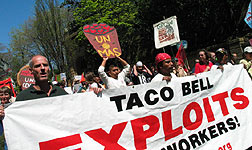 Group
against Human Trafficking through its Center for
the Advancement of Human Rights. Group
against Human Trafficking through its Center for
the Advancement of Human Rights.
In 2001, we turned a new page in our organizing,
launching the first-ever farmworker boycott of
a major fast-food company -- the national boycott
of Taco Bell -- calling on the fast-food giant
to take responsibility for human rights abuses
in the fields where its produce is grown and picked.
Taco Bell is owned by Yum Brands, the world's
largest restaurant company (bigger than McDonald's),
which pools the buying power of its five major
chain brands (Pizza Hut, KFC, Taco Bell, Long
John Silver, and A&W Restaurants) to demand
the lowest possible prices from their suppliers,
exerting a powerful downward pressure on wages
and working conditions in their suppliers' operations.
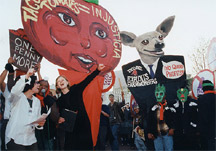 The
Taco Bell boycott has gained tremendous student,
religious, labor, and community support in the
nearly two years since its inception, including
the establishment of boycott committees in nearly
all 50 states and a fast-growing movement to "Boot
the Bell" from college and high school campuses
across the country. In 2003 we organized a 10-day
hunger strike outside of Taco Bell headquarters
in Irvine, CA -- one of the largest hunger strikes
in US labor history, with over 75 farmworkers
and students fasting during the 10-day period
-- galvanizing the support of national religious,
labor, and student organizations and thousands
of individuals. During that strike we posed Taco
Bell’s executives one question: “Can
Taco Bell guarantee its customers that the tomatoes
in its tacos were not picked by forced labor?”
They had no answer. In 2004 we organized a cross-country
tour featuring marches and actions in Louisville,
KY, and Irvine, CA, lifting the campaign to new
heights. The
Taco Bell boycott has gained tremendous student,
religious, labor, and community support in the
nearly two years since its inception, including
the establishment of boycott committees in nearly
all 50 states and a fast-growing movement to "Boot
the Bell" from college and high school campuses
across the country. In 2003 we organized a 10-day
hunger strike outside of Taco Bell headquarters
in Irvine, CA -- one of the largest hunger strikes
in US labor history, with over 75 farmworkers
and students fasting during the 10-day period
-- galvanizing the support of national religious,
labor, and student organizations and thousands
of individuals. During that strike we posed Taco
Bell’s executives one question: “Can
Taco Bell guarantee its customers that the tomatoes
in its tacos were not picked by forced labor?”
They had no answer. In 2004 we organized a cross-country
tour featuring marches and actions in Louisville,
KY, and Irvine, CA, lifting the campaign to new
heights.
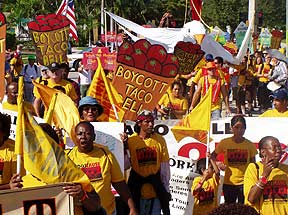 Over
the past several years, through campaigns like
the boycott and our anti-slavery work, Immokalee
has evolved from being one of the poorest, most
politically powerless communities in the country
to become today a new and important public presence
with forceful, committed leadership directly from
the base of our community -- young, immigrant
workers forging a future of livable wages and
modern labor relations in Florida's fields. In
recognition of their work, three CIW members were
recently presented the 2003 Robert F. Kennedy
Human Rights Award , the first time the award
has gone to a US-based organization in its 20
years of existence. Over
the past several years, through campaigns like
the boycott and our anti-slavery work, Immokalee
has evolved from being one of the poorest, most
politically powerless communities in the country
to become today a new and important public presence
with forceful, committed leadership directly from
the base of our community -- young, immigrant
workers forging a future of livable wages and
modern labor relations in Florida's fields. In
recognition of their work, three CIW members were
recently presented the 2003 Robert F. Kennedy
Human Rights Award , the first time the award
has gone to a US-based organization in its 20
years of existence.
|
|
 |
FAQ's about
the Taco Bell Boycott... Click on the link
below for succinct answers to some of the most frequently
asked questions about the Taco Bell boycott.
Did you know that Taco Bell's parent company, Yum Brands,
also owns KFC, Pizza Hut, Long John Silvers, and A&W
Restaurants, making it the largest restaurant company
in the world, even bigger than McDonald's?
Learn more about
the boycott by clicking here!
Click here
to go to a complete media archive since 2001
Here below are just a few of the hundreds of stories
that have been written on the boycott and our work against
modern-day slavery over the past several years. :
* University of Notre Dame Observer,
"ND
Cancels Contract with Taco Bell," August
2004
* The New Yorker ,
"Nobodies: Does Slavery Exist in America?,"
by John Bowe, April 2003 (pdf file)
* Mother Jones Magazine,
"Hellraiser of the Month:
Lucas Benitez, CIW," July/Aug 2004
* CommonDreams.org,
"Fast-food Giant Ignores Rights of Workers,"
March 2004
* The Guardian of London,
"Taco's Tomato Pickers on Slave Wages,"
March 2003
* The Nation,
"The Trouble with Tomatoes," March 2002
* Washington Post, "Immigrant
Advocates Win Award," November 2003
* St. Petersburg Times,
"A Modern Underground Railroad," December
2002
* CNN,
"Report: Modern-Day Slavery Alive and Well in Florida,"
February, 2004
* USA Today, "Students
on the Move," March 2002
* CNN en Español, Entrevista
con Lucas Benitez, CIW, Diciembre 2003 (archivo
de sonido en Español, mp3)
* Univision,
"Esclavitud en el siglo XXI" (reporte
de internet con Jorge Ramos), Enero 2004
* Miami Herald,
"Editorial: Fields of Desperation -- Destitute
Farmworkers Exploited," September 2003
* Palm Beach Post, "Editorial:
Modern Day Slavery -- Still Harvesting Shame,"
December 2003
Click
here for a complete media archive since 2001
Click on the links below to see the daily
updates, photos, video reports, and collected press clips
from the major actions since the boycott began!
*
2003 Hunger Strike
* 2002
Truth Tour
* 2003
Texas-sized Mini-Tour
* 2002 Northeast Mini-Tour
* 2002 Cross-Country Mini-Tour
|